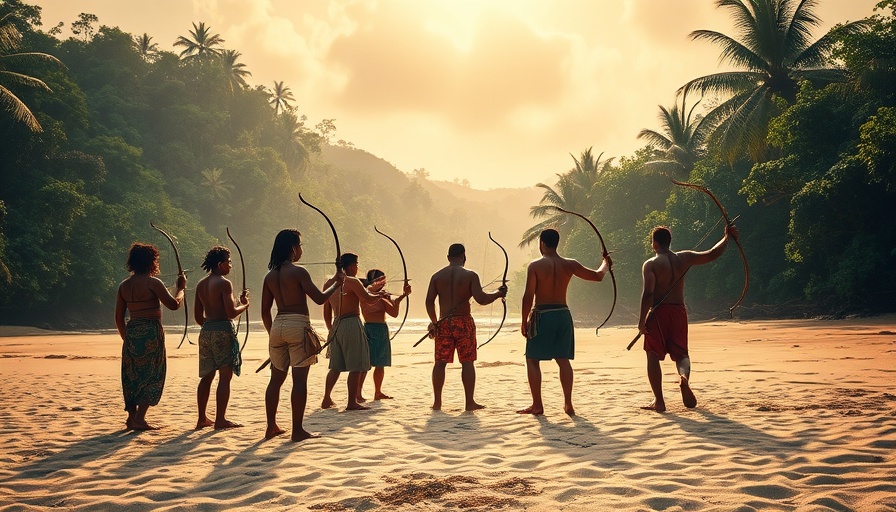
Understanding the Sentinelese: The World's Most Isolated Tribe
Navigating through the complexities of human interaction, the Sentinelese tribe remains at the forefront of discussions surrounding cultural preservation and the ethics of contact. The Sentinelese reside on North Sentinel Island in the Andaman Islands, India, and have mastered an existence largely untouched by modern society. Their isolation has led to a unique cultural identity that is entirely distinct from contemporary civilizations. Understanding their way of life and the significance of their continued isolation is critical, particularly as incidents like Mykhailo Viktorovych Polyakov's recent visit highlight ongoing tensions between indigenous rights and modern exploration.
The Controversy of Contact: Historical Context
Since India's independence in 1947, North Sentinel Island has been recognized as a protected territory. The Indian government has enforced a strict exclusion zone to protect both the tribe and outsiders from potential conflicts. Historically, previous contacts have escalated into violence, particularly following incidents where the Sentinelese have expressed their disapproval of external interference. For example, in 2006, two fishermen were killed after fishing too close to the island, prompting increased military presence to deter unauthorized visitors. The fate of the Sentinelese serves not just as a narrative about the preservation of culture, but also a stark reminder of the consequences of violating their autonomy.
Polyakov's Journey: A Risky Endeavor
Mykhailo Polyakov's attempt to reach the isolated island and leave behind gifts like a can of Coke and a coconut reflects a complex blend of curiosity and recklessness. Ignoring explicit warnings against visiting the island, he used an inflatable boat fitted with a motor, navigating treacherous waters. After reaching the island, Polyakov employed a whistle to attract the tribe's attention, signifying a blend of desperation and hope for connection. Unfortunately, this act could have provoked hostility from the indigenous people, illustrating the fine line between exploration and endangerment.
Global Implications: What This Means for Indigenous Rights
This incident raises broader questions about the ethical responsibilities of those intrigued by indigenous cultures. The discourse surrounding the rights of the Sentinelese to remain uncontacted is crucial, especially in the face of globalization. Their right to self-determination should supersede the curiosity of outsiders, a stance supported by anthropologists advocating for indigenous autonomy. Those favoring engagement must navigate a delicate balance, ensuring respect for the customs and the safety of these tribes, which are often vulnerable to foreign diseases and exploitation.
Awareness and Advocacy: Protecting Isolated Tribes
As more stories like Polyakov's emerge, there is a growing need for international advocacy to protect isolated tribes. Non-profit organizations and indigenous rights activists are pivotal in raising awareness about the dangers such encounters pose to both parties. They work toward ensuring that laws and regulations are respected while simultaneously educating the public about the importance of cultural preservation. Fostering this discussion can lead to better approaches to understand our world while respecting its most vulnerable inhabitants.
Future Perspectives: Learning from the Past
What lessons can we draw from this incident? As globalization continues to surmount boundaries, it is imperative that we respect and preserve the rich diversity of world cultures. The Sentinelese serve as a reminder of histories and lifestyles that may offer invaluable insights if approached with an honest curiosity and profound respect. Moving forward, enhancing cultural literacy can pave the way for mutual understanding and respect with indigenous communities, merging the pursuit of knowledge with ethical governance.
In conclusion, Mykhailo Polyakov's encounter may serve as a catalyst for deeper conversations about the need to protect vulnerable tribes like the Sentinelese. Igniting discussions on indigenous rights will not only foster awareness but could eventually lead to better methodologies in handling similar situations in the future. It's essential that we approach these discussions with a mindset geared toward preservation and respect, ensuring that we learn rather than impose.
 Add Row
Add Row 
 Add
Add 


 Add Row
Add Row 
 Add
Add
Write A Comment